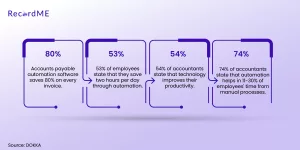What if your startup fails within the first 5 years? The 3 major investments of a business will go in vain: money, time, and energy. Small businesses and startups are the future of the economy. The fact is that the world’s best economies have 90% of small businesses. Is it making sense now? Startups and small businesses are taking the place of MNCs in the modern world. Small businesses provide great quality products and services and are often supported by customers.
How do Small Businesses and Startups Overcome Challenges?
Challenges can help grow a business when backed up with the right solution. Following strategies can help in overcoming financial and bookkeeping challenges that small businesses and startups are usually facing in 2023.
- Increase brand awareness
- Ease access to capital
- By managing finances
- Manage time efficiently
- Protect financial data from cyber attacks
- Introduce automated bookkeeping services
What are the Overall Business Challenges Faced by Small Businesses and Startups?
A business startup is always tough, and only owners know how many difficulties have been overcome. Understanding the competitors is the major challenge. The affirmative plan can get successful if backed up by the best strategies. Another challenge that small businesses face is identifying the problem and understanding it. These challenges can include hiring the right employee, creating a customer base or targeting an audience, and building a brand. Some of the biggest challenges are,
- Inappropriate Use of Budget
- Inconsistent Cash Flow
- Dealing with too much Debt
- Mix personal and Business Finances
- Poor Tax Compliance
- Lack of Capital
1) Inappropriate Use of Budget
Small businesses or business startups easily run out of money at the end of every month. Owners usually neglect to pay bills because they don’t understand the importance. Usually, 45% of SMBS fail during the first five years due to neglecting the budgeting process.
2) Inconsistent Cash Flow
SMBs and startups usually need help managing their cash flows. While liquidity is a continuous issue, managing cash flow goes parallel with it. Usually, companies wait to pay bills on time, which affects the investment to grow the business.
3) Dealing with too much Debt
Small business owners usually can’t start a business on debt. The reason for taking too much debt might be that the owner needs more money to enhance productivity.
4) Mix personal and Business Finances
Keeping business and personal finance separate is the major lesson that many owners of SMBs ignore. 23% of startups usually mix up the personal and business financial situation because they don’t keep track of finances.
5) Poor Tax Compliance
Up to 85% of SMBs overpay federal income taxes every year. Cash management is already difficult enough to handle so does the tax. This situation takes money, effort, and time that usually SMBs and startups don’t give.
6) Lack of Capital
82% of SMBs and startups don’t know how to interpret the financial position of a business. Applications for loans applied for funding in the first five years have been denied. Because they need a financial plan to execute when asked by any financial institute. Lack of financial capital is the main issue that every startup and SMB faces. Almost 41% of business loans are approved when they have the summary of a sound financial plan.

Financial Strategies of SMBs and Startups
You should know where you want to see your business in the upcoming years. Many things fall under the financial strategy like you want to increase sales by 30%. How will you achieve this? Business strategies will only help some business owners to execute sound and accurate financial plans.
1) Maintain the Best Financial Habits
It’s necessary for new businesses and SMBs to keep track of financial records. Managing financial records helps provide all the necessary financial details, like audit reports and financial statements. Modern technologies like RecordMe help in keeping track of every financial transaction. It provides the best-automated bookkeeping services to its customers.
It also helps customers to maintain separate accounts of their personal and business financial information. Moreover, the OCR strategy helps in recording transactions in minutes.
2) Payment Policy
It is necessary to keep track of your invoices to maintain the business’s liquidity. Paying your client is the major responsibility of your business that affects the cash flow process. Usually, in work overload, owners and customers forget to pay invoices. Cloud-computing apps can help in making your accounts process easy.
Automating your accounts payable and receivable means online web software automatically reminds the customers and owners. These reminders help to pay invoices on time.
3) Understand Financial Statements
As a business owner, it is essential to understand the financial statements. Statements like balance sheets and ledgers can sound complex, and your bookkeepers can deal with them. Record me has reduced these complexities by providing OCR technology to customers.
What does OCR do?
OCR-optical character recognition automatically retrieves the data by scanning invoices. Everything like date, name of supplier or customer, product name, and serial no. is retrieved by software. It makes the entering financial entry process accurate and reliable without any human error.
-
Monitor the Financial Credit Process
Usually, 83% of SMBs earn less than 100,000$. They usually add from their savings to meet their daily expenses. Also, they took a loan from vendors to make investments. Automated bookkeeping services have solved this issue by introducing instant audit-ready reports. The audit is done under expert supervision and is 100% reliable and accurate.
-
Protection from Cybersecurity Attacks
Cyber attacks can put you in a situation to exit your business. These cyber-attacks can be in the form of viruses and malware. Only one wrong click at any link, and all your data is gone. SMBs and startups are at higher risk of cyber attacks. Online web software provides the facility to protect your financial statements from cyber attacks.
Key Takeaways
RecordMe satisfies its customers by providing more accurate and reliable financial data. The average time to record financial entries is 5 minutes, which RecordMe has reduced to 1 to 1.5 minutes. RecordMe is made in a very simple way so that every individual can understand its specifications. All the core requirements are added in the software, grab the ticket and add your requirements.






